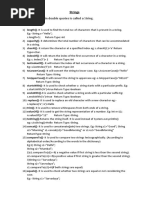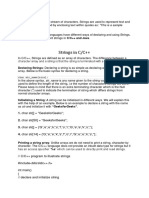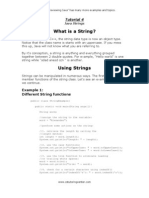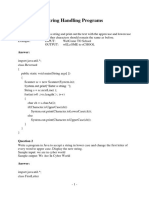Java Strings: Wikipedia: String (Computer Science)
Uploaded by
Wael AbdulalJava Strings: Wikipedia: String (Computer Science)
Uploaded by
Wael AbdulalJava Strings
Introduction
"A string is traditionally a sequence of characters, either as a literal constant or as some kind of variable."
— Wikipedia: String (computer science)
This exercise is to test your understanding of Java Strings. A sample String declaration:
String myString = "Hello World!"
The elements of a String are called characters. The number of characters in a String is called the length,
and it can be retrieved with the String.length() method.
Given two strings of lowercase English letters, and , perform the following operations:
1. Sum the lengths of and .
2. Determine if is lexicographically larger than (i.e.: does come before in the dictionary?).
3. Capitalize the first letter in and and print them on a single line, separated by a space.
Input Format
The first line contains a string . The second line contains another string . The strings are comprised of
only lowercase English letters.
Output Format
There are three lines of output:
For the first line, sum the lengths of and .
For the second line, write Yes if is lexicographically greater than otherwise print No instead.
For the third line, capitalize the first letter in both and and print them on a single line, separated by a
space.
Sample Input 0
hello
java
Sample Output 0
9
No
Hello Java
Explanation 0
String is "hello" and is "java".
has a length of , and has a length of ; the sum of their lengths is .
When sorted alphabetically/lexicographically, "hello" precedes "java"; therefore, is not greater than
and the answer is No .
When you capitalize the first letter of both and and then print them separated by a space, you get
"Hello Java".
You might also like
- 50. PRACTICE QUESTION ON ARRAY AND STRINGNo ratings yet50. PRACTICE QUESTION ON ARRAY AND STRING59 pages
- Write A Java Program To Count The Number of Words in A String?No ratings yetWrite A Java Program To Count The Number of Words in A String?4 pages
- Notes On JAVA 10.2005.6: The String Data Type: Constructor InputNo ratings yetNotes On JAVA 10.2005.6: The String Data Type: Constructor Input2 pages
- Chapter 4: Mathematical Functions, Characters, and Strings Character Data TypeNo ratings yetChapter 4: Mathematical Functions, Characters, and Strings Character Data Type17 pages
- Learn Java - String Methods Cheatsheet - CodecademyNo ratings yetLearn Java - String Methods Cheatsheet - Codecademy2 pages
- Class: X ICSE Assignment On Strings: Carmel High SchoolNo ratings yetClass: X ICSE Assignment On Strings: Carmel High School1 page
- Java Strings: Creating Strings String MethodsNo ratings yetJava Strings: Creating Strings String Methods19 pages
- Ferrell Book 7th Ed Java-Programming-Ch7No ratings yetFerrell Book 7th Ed Java-Programming-Ch748 pages
- Java for Black Jack: Learn the Java Programming Language in One Session by Writing and Running a Java-Based Card Game SimulationFrom EverandJava for Black Jack: Learn the Java Programming Language in One Session by Writing and Running a Java-Based Card Game SimulationNo ratings yet
- SQL Server Database Cloning Tool Using C#No ratings yetSQL Server Database Cloning Tool Using C#14 pages
- Syllabus For ENGR140: Introduction To Object Oriented ProgrammingNo ratings yetSyllabus For ENGR140: Introduction To Object Oriented Programming2 pages
- Chapter 1: Introduction To Computers, Programs, and C++: Sections 1.1-1.3, 1.6-1.9No ratings yetChapter 1: Introduction To Computers, Programs, and C++: Sections 1.1-1.3, 1.6-1.9298 pages
- Syllabus For ENGR140: Introduction To Object Oriented ProgrammingNo ratings yetSyllabus For ENGR140: Introduction To Object Oriented Programming2 pages
- Neural Networks For Optimization and Signal ProcessingNo ratings yetNeural Networks For Optimization and Signal Processing549 pages








































































